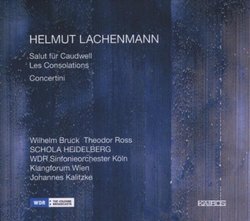"Concertini" -- a new Lachenmann masterpiece
R. Hutchinson | a world ruled by fossil fuels and fossil minds | 04/19/2010
(5 out of 5 stars)
"This is a great new Helmut Lachenmann collection, but it is not what it appears. For one thing, it is quite zany. It makes me smile, it even makes me laugh out loud, but you would not suspect that from the standard, austere Kairos cover art. Also, the title is misleading. "Les Consolations" is not a new piece, it was finished in the late 1970s, but is only now recorded for the first time. "Concertini," which is brand new, is NOT a first recording, though it is the first that most of us in the U.S. will see. It was written for and premiered by the Ensemble Modern at the Lucerne Festival in 2005, and the EM recorded it on their own in-house label (which is available only through their website). So this Klangforum Wien recording, led by Johannes Kalitzke, is the second. The third piece, "Salut fur Caudwell," is a new recording of a 1977 composition. I'm not at all sure what the logic was of bringing these three pieces together, but my theory is that the common element is their zaniness quotient -- it's the Wacky Helmut album.
"Concertini" is 37 minutes long, a whirlwind of motion that zooms, whirs and vanishes only to reappear in a new form and zoom off again. It is not any sort of typical concerto, that's for sure. Lachenmann says that there are indeed soloistic opportunities, but also for "'all-instrument-types' of action and articulation. These include a 'scraping concerto' and 'solos' for spatial movement, for resonance, sound sequences, rhythmic patterns..." He goes on to say that "[t]he concertante arrangement allows an ever-shifting balance between accompanying, disguising, covering, uncovering, counterpointing, how and where transformation occurs, every aspect of this ad hoc collection of sound categories..." But that insight doesn't hint at how wild the ride is! I have by now heard quite a few Lachenmann recordings, and this is the most extroverted and accessible of them all. Not that it will please your typical classical music listener, but it is louder, faster and more varied than many of his compositions.
"Salut fur Caudwell" (25'14) is performed by the same two guitarists it was written for and who premiered it in 1977, Wilhelm Bruck and Theodor Ross. The guitars alone are pretty zany, but the piece also includes spoken word taken from "Illusion and Reality" by the English Marxist poet and author Christopher Caudwell, who died at the age of 30 while fighting Franco in Spain as a premature antifascist. Not understanding German, this spoken word just makes the piece even zanier than it is already, as the syllables are broken into an odd cadence. And maybe it's laughing at the bourgeoisie and the fascists that Lachenmann wants. If not, I hope he can live with it. This piece goes on several minutes too long, but that is a minor complaint in the face of such amusement.
"Les Consolations" (32'30) features the SCHOLA HEIDELBERG choral group (yes, all caps) and the WDR Sinfonieorchester Koln, led by Johannes Kalitzke. This was Lachenmann's first use of Hans Christian Anderson's story of "The Little Match Girl," which he would turn into a quite extreme opera/"musik mit bildern" several years later ("Das Madchen mit den Schwefelholzern"). But amazingly, this earlier work has as zany an edge as the later one is serious and severe. I don't know now to reconcile the affect and the content, all I can do is report. The vocals and instrumental music are much more extroverted than in "Das Madchen," with lots of scraping and sound effects, but it is quite upbeat and amusing. The voices are largely warm and appealing, quite a contrast with the cold, sibilant whispering of the later work.
This is the best Lachenmann since the ECM Ensemble Modern disc which I reviewed in 2003. It would seem to be Lachenmann's answer to Frank Zappa's question "Should There Be Humor In Music?" Of course we all know Frank's answer. That Helmut agrees is a happy surprise!
As Lachenmann said in 1971, quoted in the liner notes: "What I want is always the same; a music which in order to be grasped, does not require a privileged intellectual training, but can rely uniquely upon its compositional clarity and logic; a music which is at the same time the expression and the aesthetic form of a curiosity able to reflect everything -- including the illusion of progressiveness. Art as a foretaste of freedom in an age without freedom."
(verified purchase from ArkivMusic)"


 Track Listings (6) - Disc #1
Track Listings (6) - Disc #1